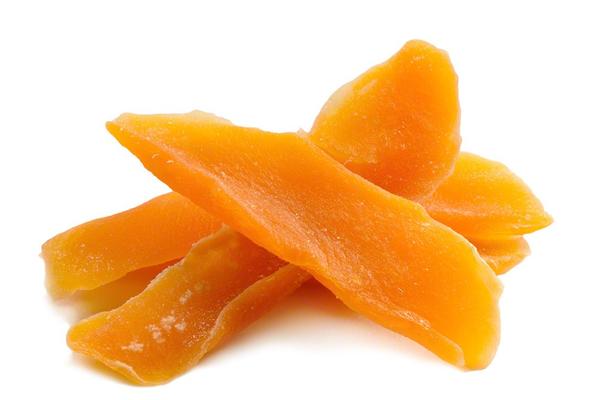 Dried mangoes can be eaten as is, as snacks and dessert or used as ingredient for ice cream mixes and toppings. In the dehydration of fruits, several factors like choice of drying equipment and operating conditions must be considered in the drying process because these can have strong impact on the physical properties of the finished product. Dried Mango(Osmosis) Ingredients * 10 kl. fresh firm ripe mangoes * 1 1/2 kl. sugar * 5 grams of sodium metabisulfite Note: Green mangoes can also be used for dried green mangoes, following the same procedure. Procedure 1. Weigh and wash fruits thoroughly. 2. Peel. Slice longitudinally. Separate choice cuts from chips. 3. Weigh mango slices. 4. Add 30% sugar. Allow to stand for 4-6 hours. 5. Drain. Add 1% sodium metabisulfite to syrup. 6. Boil Syrup. Add mango slices and boil for 3 minutes. 7. Let stand overnight. Drain. Collect syrup 8. Wash mango slices with warm water. Drain. 9. Spread on trays and dry in solar dryer for 16 hours. 10. Sweat for 12 hours. Sprinkle confectionaire’s sugar. 11. Pack in polythylene/polypropylene bags. Agricultural TrainingInstitute (ATI) by Kristina Mae R. Ombao (managing editor and desktop publishing artist), Antonieta J. Arceo(editor), Virginia de la Fuente (subject matter specialist), Roberto T. Masbang and Editha S. Vinuya (editorialconsultants) Asterio P. Saliot, MNSA and Alberto B. Maningding, MNSA and Evelyn Aro-Esquejo, Ph.D. (advisers) Reference: Department of Science and Technology. Basic Methods in Mango Processing. University of the Philippines College of Home Economics. Comprehensive Training Course on Mango Processing and Quality Control. Copyright 2006 For more information, please write or call: Agricultural Knowledge Management Division AGRICULTURAL TRAINING INSTITUTE ATI Bldg., Elliptical Rd., Diliman, Quezon City Trunkline: (63-2) 929-8541 to 49 Fax Number: (63-2) 926-4623 Website: www.ati.da.gov.ph
Dried mangoes can be eaten as is, as snacks and dessert or used as ingredient for ice cream mixes and toppings. In the dehydration of fruits, several factors like choice of drying equipment and operating conditions must be considered in the drying process because these can have strong impact on the physical properties of the finished product. Dried Mango(Osmosis) Ingredients * 10 kl. fresh firm ripe mangoes * 1 1/2 kl. sugar * 5 grams of sodium metabisulfite Note: Green mangoes can also be used for dried green mangoes, following the same procedure. Procedure 1. Weigh and wash fruits thoroughly. 2. Peel. Slice longitudinally. Separate choice cuts from chips. 3. Weigh mango slices. 4. Add 30% sugar. Allow to stand for 4-6 hours. 5. Drain. Add 1% sodium metabisulfite to syrup. 6. Boil Syrup. Add mango slices and boil for 3 minutes. 7. Let stand overnight. Drain. Collect syrup 8. Wash mango slices with warm water. Drain. 9. Spread on trays and dry in solar dryer for 16 hours. 10. Sweat for 12 hours. Sprinkle confectionaire’s sugar. 11. Pack in polythylene/polypropylene bags. Agricultural TrainingInstitute (ATI) by Kristina Mae R. Ombao (managing editor and desktop publishing artist), Antonieta J. Arceo(editor), Virginia de la Fuente (subject matter specialist), Roberto T. Masbang and Editha S. Vinuya (editorialconsultants) Asterio P. Saliot, MNSA and Alberto B. Maningding, MNSA and Evelyn Aro-Esquejo, Ph.D. (advisers) Reference: Department of Science and Technology. Basic Methods in Mango Processing. University of the Philippines College of Home Economics. Comprehensive Training Course on Mango Processing and Quality Control. Copyright 2006 For more information, please write or call: Agricultural Knowledge Management Division AGRICULTURAL TRAINING INSTITUTE ATI Bldg., Elliptical Rd., Diliman, Quezon City Trunkline: (63-2) 929-8541 to 49 Fax Number: (63-2) 926-4623 Website: www.ati.da.gov.phSource: Business Diary Philippines



0 Comments